A Conversation With David Morrell
by Claire E. White
New York Times bestselling author David Morrell
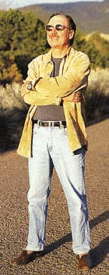
|
In 1966, the work of another writer (Hemingway scholar Philip Young) prompted Morrell to move to the United States, where he studied with Young at Penn State and received his M.A. and Ph.D. in American literature. There, he also met the distinguished fiction writer William Tenn (real name Philip Klass), who taught Morrell the basics of fiction writing. The result was First Blood, a novel about a returned Vietnam veteran suffering from post-trauma stress disorder who comes into conflict with a small-town police chief and fights his own version of the Vietnam War. Rambo became an instant success, spawned a series of blockbuster feature films, and became an American icon.
That "father" of all modern action novels was published in 1972 while Morrell was a professor in the English department at the University of Iowa. He taught there from 1970 to 1986, simultaneously writing other novels, many of them national bestsellers, such as The Brotherhood of the Rose (the basis for a highly rated NBC miniseries starring Robert Mitchum). Eventually wearying of two professions, he gave up his tenure in order to write full time.
Shortly afterward, his fifteen-year-old son Matthew was diagnosed with a rare form of bone cancer and died in 1987, a loss that haunts not only Morrell's life but his work, as in his memoir about Matthew, Fireflies, and his novel Desperate Measures, whose main character has lost a son.
Morrell is the author of twenty-four books, including the bestselling thrillers The Fifth Profession, Assumed Identity, and Extreme Denial (set in Santa Fe, New Mexico, where he now lives with his wife, Donna). His most recent books are the dark-suspense novel Long Lost and Lessons from a Lifetime of Writing, an analysis of what he has learned during his more-than-thirty years as a writer. Kirkus Reviews says that Long Lost is, "Cain and Abel rematched -- in a surprising and savvy departure for spymeister Morrell...Altogether: good storytelling, neatly plotted and admirably paced, Morrell's best in years."
Noted for his research, Morrell is a graduate of the National Outdoor Leadership School for wilderness survival as well as the G. Gordon Liddy Academy of Corporate Security. He is also an honorary lifetime member of the Special Operations Association and the Association of Former Intelligence Officers. He has been trained in firearms, hostage negotiation, assuming identities, executive protection, and anti-terrorist driving, among numerous other action skills that he describes in his novels. With eighteen million copies in print, his work has been translated into twenty-two languages.
When he's not writing, you might find David spending time with his wife, Donna, learning a new action skill for an upcoming book, polishing up his tennis serve, or tending his garden. He spoke with us about Long Lost, and how he overcame the incredible challenges of his childhood to be a bestselling author. He also talks about his new writing book, and gives some great advice to aspiring novelists.
I'd like to first talk about your new novel, Long Lost. How did this book come about -- what was your inspiration for this story?
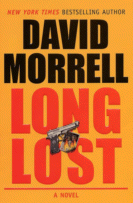
|
One of the book's themes is how a different upbringing can affect members of the same family, which is certainly a hot topic now. What is your opinion on the "nature vs. nurture" argument? How much of our personalities are we born with, and how much are created by our environment?
In Europe, in the late 1700s, people felt that someone raised in a state of nature would be inherently innocent and ethical. My own feeling is the opposite, that humans in a state of nature would behave like animals and that all we can rely on to keep us from the dark side is civilization. Freud wrote about this in an essay called "Civilization and Its Discontents." The problem is that civilization has its good and bad sides and it's sometimes difficult to distinguish them. On a small scale, a family is a civilization. To the degree that the parents teach their children ethical behavior, to that degree the children learn order and discipline. But if the children are allowed to run free and have only peer activity to imitate, they'll revert to their animal instincts. For me, in a debate between nature and nurture, nurture is the most important factor.
The hero of the story is Brad Denning, a complex man who has to face some terrible things from his childhood. How did you create the character of Brad?
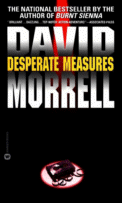
|
What went into your decision to have Brad tell the story in first person?
I've used the first-person viewpoint in short stories, but Long Lost is the first novel in which I've employed that viewpoint. The "I" narrator is a dangerous viewpoint because it tends to lead to wordiness, to telling rather than showing, and to an over-reliance on the sense of sight (the consequence of which is "flat" writing). As an experiment, I wanted to try it, however, because I felt that it was extremely appropriate to the main character's emotions. Usually, in an abduction story, an author will choose alternating third-person viewpoints in which the victims, the police, the villain, and the person left behind are dramatized. But in life, there are no such alternating viewpoints. What happens to each of us happens one hundred percent. Each of us is trapped in an isolated viewpoint. In Long Lost, I wanted to communicate that sense of isolation.
Another key character is that of the man that claims to be Petey, Brad's long-lost brother. How did you create the character of Petey? Were there any personality traits that you were specifically trying to avoid with him?
| "[K]eep writing. If you're determined to write, then you accept the conditions within which you're forced to survive. There's no alternative. Write, write, write, keep writing. With modern PC software, self-publishing is easy to learn. If you believe in your work and you haven't found a publisher to help you, then do it yourself." |
How do you approach writing action scenes? Do you have a special method?
The key to writing action scenes (and every other kind of scene) is to make them multi-dimensional, which is another way of saying that I try to take the sense of sight for granted and then appeal to two other senses at the same time in a technique that John Barth calls "triangulation." Using these other senses makes the reader feel the scene rather than see it. The other technique I use is to ensure that the reader is oriented in terms of what's to the right and what's to the left, etc., to provide a sense of the space in which the action movies. Pacing is also an issue-how much detail to include and how much to leave out. The goal is to keep things moving, and if I've done my job correctly, the action scenes will seem to have been effortlessly written, even though they've been revised a hundred times.
You have had some amazing adventures researching your books -- training in everything from wilderness survival to antiterrorist driving -- what was the most interesting experience that you had while researching a book?
Research is essential. Otherwise, we end up imitating bad TV shows and movies rather than showing readers new things. We're all familiar with the scene in a police show where the detective finds a bag of white powder, slits it open, sticks a finger in it, tastes in, and nods wisely, saying, "Tastes like cocaine." In life, this could never happen. A detective would have to be an idiot to act like that. The powder could be rat poison. But we see versions of this scene in all sorts of stories, and the reason is, the writer didn't do the research. I try to learn about everything I write about. Then I send my manuscripts to the experts I learned from and ask them to point out any errors. I've had courses in wilderness survival (lived for 30 days above timber line in the Wyoming mountains), in being a bodyguard, in surveillance, electronic eavesdropping, hostage negotiation, firearms, etc. My most fun experience was learning how to car fight. I went to the Bill Scott Raceway in West Virginia where many government agencies send their agents so they can learn how to use a car to defend themselves if they're attacked while they're in a vehicle. I learned how to do the forward and backward spins at high speeds, how to ram barricades, etc. I grinned for the entire five days. The outdoor survival research was especially helpful when I was writing Long Lost.
What was the greatest challenge you faced in writing this novel?
The greatest challenge in writing Long Lost was to control the first-person viewpoint, to keep it from getting wordy. In my final draft, I cut about a third of the manuscript to keep it lean. No scenes were cut, only needless words.
Let's talk about your writing book, Lessons From a Lifetime of Writing. What prompted you to finally write a book on writing?
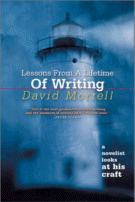
|
As a professor, what were the most common writing mistakes you saw in students' writing?
The most common mistake that apprentice fiction writers make is something I mentioned earlier -- they rely so much on the sense of sight that their prose feels flat. Another common mistake is that they begin at the wrong place in the story, thus requiring the unfortunate use of flashbacks. Also, they tend to fall into the trap of imitating movie dialogue, which is quite different from dialogue in fiction. In Lessons From A Lifetime of Writing, I devote an entire chapter to what causes bad dialogue.
What did you enjoy most about teaching?
| "The most common mistake that apprentice fiction writers make is [relying] rely so much on the sense of sight that their prose feels flat. Another common mistake is that they begin at the wrong place in the story, thus requiring the unfortunate use of flashbacks." |
In your book you state, "Next to a lack of ability, the worst flaw I can think of for a would-be writer is ignorance about literary history." Would you elaborate on this for us?
I once had a student who told me that he wanted to write a detective novel. To me, all types of books are equally valid, and I applauded his intention. Six months later, he returned with a manuscript that read like an imitation of the Humphrey Bogart private-eye movies based on work by Raymond Chandler and Dashiell Hammett. It was a well-written book, but it was old-fashioned and derivative, with no chance of being published. I explained to him that before he put in so much time writing a book, he should have researched the genre so that he would know what had already been done and be able to add to the history of the genre rather than imitate what had already been accomplished. That's the key-to know what has been written so that we can move forward, not backward.
When did your love of books start? Was there anyone in your childhood who encouraged you to read?
My mother and step-father did not read. I wasn't encouraged to do so. But I was an only child who spent a great deal of time alone. I eventually learned that books could be wonderful companions, and in an unhappy home, I sought refuge in reading whenever I could. The next step was to write books so that I could give others the chance to find a refuge from their lives. As John Barth says, "Reality's a nice place to visit, but you wouldn't want to live there."
One of the themes seen in some of your books is the relationship between fathers and sons. Has writing about this theme been helpful to you in your life?
Writing about fathers and sons has been a sort of compulsion that I didn't realize controlled me until I reached the middle of my career. As I mentioned, my father died in World War Two. I was an infant. I'm not sure if he ever saw me. I grew up, profoundly missing a sympathetic male authority figure in my life. Perhaps that's why I relied on mentors. In First Blood, the conflict between Rambo and the police chief can be seen as a conflict between a father and a son. In The Brotherhood of the Rose, an elderly member of the CIA befriends two male orphans, making them relate to him as sons to a father. He then betrays them (as my father betrayed me when he was killed?). It's all self-psychoanalysis, although I never realize it at the time. A situation grabs me. I feel compelled to write about it. Later, I understand why the subtext of the situation is important to me. When my son died from cancer, the theme of some of the later novels shifted from the "search for the father" to the "search for the son," which is evident in Long Lost.
You have spoken about the important roles that Stirling Silliphant and Philip Klass had in your life. What was the most important lessons that you learned from these men about writing? About life, in general?
Stirling Silliphant was a major film writer whose scripts for the classic TV show Route 66 changed my life and made me want to become a writer. Philip Klass wrote classic science-fiction under the name William Tenn. Both these men became my mentors. What I learned from them was to write fiction whose themes meant something to me (be yourself, don't imitate). From Stirling, I also learned how to write and write and write. All my professional discipline comes from him. I talk extensively about them in Lessons From a Lifetime of Writing.
Your most famous character is Rambo, the Viet Nam vet who was introduced in First Blood. I realize that the first film changed quite a few things from the book, but how happy, in general, were you with the first film in the series?
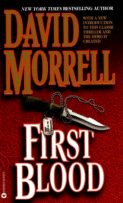
|
Sylvester Stallone has recently said that there well may be a fourth Rambo movie. If so, would you be willing to write the novelization of the film? I understand you still own the print rights?
Yes, there's a rumor going around that Sylvester might do another Rambo movie. I think it's just that -- a rumor. As near as I can tell, it started after Sept. 11 when people remembered that in the third Rambo movie the character went to Afghanistan. People began wondering how Rambo would deal with terrorists. All of a sudden, the idea appeared in print as if it were fact, not rumor. I spoke to Sylvester in March of 2001, and at that time he had no intention of returning to the character. If a fourth movie does get filmed, I'd have to consider the script before I decided if I'd do another novelization (a prose embellishment of a screenplay). For the other novelizations, I was motivated to add some elements to the stories so they wouldn't be merely "Rambo shoots this guy" and "Rambo shoots that guy." (I had nothing to do with those screenplays.) Also I was experimenting with a type of fiction that I'd never tried. Now I've been there and done that. Whether I'd do it again, I'd have to think long and hard about. One thing we know is that I retain print control of the character and no one else can write fiction or novelizations about him.
How has the publishing world changed since you published your first novel?
When my first novel First Blood was published in 1972, there were numerous publishers, most of them independent, each with a particular personality. Since then, the number of publishers has gotten severely smaller, and most of those who remain are part of a few huge multi-company empires with bureaucratic personalities. One consequence is that there are fewer places for a writer to take a novel. Another consequence is that the remaining publishers are less willing to take chances with unusual projects. Controlled by profit-minded conglomerates, they keep their eye on the bottom line. Still another consequence is that most conglomerates have reduced the size of their personnel. Publishers, following suit, have forced staff members to take on too many tasks, with the consequence that only the most bestselling of authors get the attention that all authors deserve.
What is your advice to aspiring writers who are feeling a bit discouraged by the current state of book publishing?
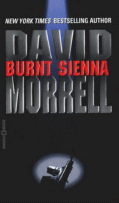
|
What is your opinion of the rise of the Internet and ebooks? How will the major technology changes we are experiencing affect book publishing and/or the novelist?
The Internet is an amazing way to transmit information. I use it extensively for research and for publicity. In fact, I've just acquired a website: davidmorrell.net. I couldn't get .com because an aviation photographer with my name already had the .com. So now I'm a network, and readers who visit my site will be amazed by how much information I give them. As far as ebooks go, I'm old-fashioned and want to hold a text in my hand, so I doubt that I'll be experimenting in that direction, but you never know.
When you're not working, what are your favorite ways to relax and have fun?
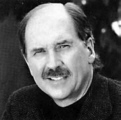
|
I'm an avid tennis player. In the summer, I love working in our vegetable garden (a throw-back to the poverty of my graduate-school days). I enjoy reading -- that goes without saying. I also enjoy watching movies on DVD. Research for my novels is also a wonderful form of entertainment, going out and learning to do the exciting things that I write about.
Return to the October 2002 issue of The IWJ.
More from Writers Write
